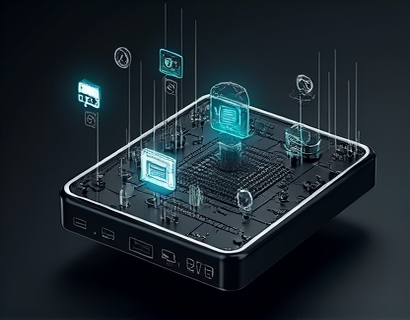AI-Powered Healthcare: Revolutionizing Access to Expert Insights and Personalized Support
In the rapidly evolving landscape of healthcare, the integration of artificial intelligence (AI) is transforming the way individuals access medical advice and manage their health. This shift towards AI-powered healthcare solutions offers unprecedented opportunities for health enthusiasts and individuals seeking personalized medical insights. By leveraging advanced technology, these platforms provide instant expert advice and tailored support, empowering users to make informed decisions about their well-being.
The advent of AI in healthcare is not just about automating routine tasks; it's about creating a more responsive, efficient, and personalized healthcare ecosystem. Traditional healthcare models often struggle to provide timely and individualized care due to resource constraints and the complexity of medical information. AI-driven platforms bridge this gap by offering real-time, data-driven insights and expert guidance, accessible from anywhere with an internet connection.
Instant Access to Personalized Medical Insights
One of the most significant advantages of AI-powered healthcare platforms is the ability to deliver instant personalized medical insights. These platforms use machine learning algorithms to analyze vast amounts of medical data, including symptoms, medical history, and lifestyle factors, to provide users with relevant and accurate information. This immediate access to expert-level insights can be a game-changer for individuals who need quick answers to their health concerns.
For instance, a user experiencing unusual symptoms can input their details into the platform, and within moments, receive a list of potential conditions along with recommended next steps. This instant feedback loop not only alleviates immediate concerns but also encourages proactive health management. Users can monitor their symptoms over time, track changes, and receive updates based on new data, fostering a continuous and dynamic health dialogue.
Expert Advice at Your Fingertips
AI-powered healthcare platforms go beyond providing basic information by connecting users with virtual health experts. These experts, often board-certified physicians and specialists, use AI to streamline the consultation process, making high-quality medical advice more accessible. Users can engage in text or voice-based consultations, receiving detailed explanations of their conditions, treatment options, and preventive measures.
The integration of AI ensures that these consultations are efficient and tailored to the individual's needs. The system can pre-asses the user's input, flagging critical issues that require immediate attention, and directing the expert's focus accordingly. This approach not only enhances the quality of care but also reduces the burden on healthcare professionals, allowing them to allocate their time more effectively.
Enhanced Decision-Making Through Data-Driven Insights
The true power of AI in healthcare lies in its ability to transform raw data into actionable insights. By analyzing patient data, AI algorithms can identify patterns and correlations that might be missed by human eyes. This data-driven approach enables users to make more informed decisions about their health, from choosing the right treatments to adopting lifestyle changes that promote well-being.
For example, an AI-powered platform can analyze a user's dietary habits, exercise routine, and sleep patterns to provide personalized recommendations for improving overall health. By visualizing this data through intuitive dashboards, users gain a clearer understanding of how different factors impact their well-being, empowering them to take proactive steps towards a healthier lifestyle.
Personalized Health Management and Monitoring
Personalization is a cornerstone of AI-powered healthcare. These platforms use machine learning to create individualized health profiles, taking into account a user's unique medical history, genetic predispositions, and lifestyle factors. This comprehensive approach ensures that the advice and insights provided are highly relevant and effective.
Continuous monitoring is another key feature. Wearable devices and mobile apps integrated with AI platforms can track vital signs, activity levels, and other health metrics in real-time. The AI system analyzes this data to detect anomalies, predict potential health issues, and alert users to take preventive actions. This proactive monitoring can lead to early intervention, reducing the risk of serious health complications.
Building Trust Through Reliable Information
Trust is essential in healthcare, and AI-powered platforms are designed to build and maintain this trust by providing reliable and evidence-based information. The algorithms used by these platforms are trained on extensive medical databases, ensuring that the insights and advice given are grounded in the latest scientific research and clinical guidelines.
Moreover, these platforms often include features that allow users to verify the sources of the information provided. Users can access citations from peer-reviewed journals, official health guidelines, and expert opinions, giving them confidence in the accuracy of the advice they receive. This transparency not only enhances user trust but also promotes a more informed and engaged patient population.
Overcoming Barriers to Healthcare Access
One of the most significant challenges in healthcare is the disparity in access to quality medical services, particularly in underserved and remote areas. AI-powered healthcare platforms help bridge this gap by providing equitable access to expert advice and medical information. Regardless of geographical location or socioeconomic status, users can benefit from high-quality healthcare support.
These platforms also address the issue of language barriers by offering multilingual support. AI-driven translation tools ensure that non-native speakers can understand and act on the advice provided, further democratizing access to healthcare resources. This inclusivity is crucial in creating a more equitable healthcare system.
Enhancing Patient-Provider Communication
The integration of AI in healthcare extends beyond direct user interactions, also enhancing the communication between patients and healthcare providers. AI-powered platforms can serve as a bridge, facilitating more efficient and effective consultations. Providers can access a comprehensive overview of a patient's health data, including AI-generated insights, before the consultation, allowing for more informed and targeted discussions.
Additionally, AI can assist in managing patient records, scheduling appointments, and sending reminders, reducing administrative burdens and allowing providers to focus more on patient care. This streamlined communication not only improves the patient experience but also enhances the overall quality of care.
Challenges and Considerations
While the benefits of AI-powered healthcare are substantial, it is important to acknowledge and address the challenges and considerations associated with this technology. Privacy and data security are paramount concerns, as sensitive health information must be protected from unauthorized access and breaches. Robust security measures, compliance with regulations like HIPAA, and transparent data handling practices are essential to build and maintain user trust.
Another consideration is the potential for over-reliance on AI. While AI provides valuable insights, it should complement rather than replace human expertise. Healthcare professionals play a crucial role in interpreting AI-generated data, providing emotional support, and making complex decisions that require human judgment. Striking the right balance between AI and human input is key to delivering comprehensive and compassionate care.
The Future of AI in Healthcare
The future of AI in healthcare is promising, with ongoing advancements poised to further enhance the capabilities of these platforms. As machine learning algorithms become more sophisticated, the accuracy and personalization of healthcare insights will continue to improve. Integration with emerging technologies like augmented reality and blockchain can open new avenues for innovative healthcare solutions.
Moreover, the increasing adoption of AI in healthcare is likely to drive down costs and improve efficiency, making high-quality care more accessible to a broader population. As the technology matures, we can expect to see even more seamless integration into daily health management, from personalized medicine to predictive health analytics.
In conclusion, AI-powered healthcare platforms are transforming the way individuals access and manage their health. By providing instant expert insights, personalized support, and reliable information, these platforms empower users to take control of their well-being. As the healthcare landscape continues to evolve, the role of AI will become increasingly central, paving the way for a more informed, proactive, and equitable healthcare system.










































